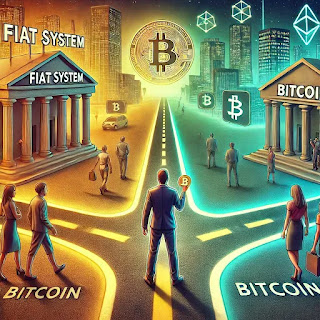The $123K Signal: Bitcoin's Institutional Breakout
Bitcoin just hit $123,000. Let that sink in for a second. We’re no longer talking about potential—we are watching history unfold in real time. For the early adopters, this is vindication. For the skeptics, it's a wake-up call. And for the world? It's a shift in monetary gravity.
For years, Bitcoin was the outsider. The misunderstood digital asset mocked by mainstream media, dismissed by economists, and shunned by institutions. It was likened to tulips, beanie babies, or worse, a Ponzi scheme. But Bitcoin kept ticking. One block at a time, it kept proving its resilience. Through bear markets, exchange collapses, regulatory storms, and coordinated FUD campaigns, Bitcoin didn't blink. Because Bitcoin doesn’t have a CEO. It doesn’t have a marketing department. It just runs. Unstoppable. Predictable. Incorruptible.
But something has shifted. Actually, a lot has. Because now, not only are the institutions here, they’re backing the truck up.
The ETF floodgates opened in early 2024, and what was once the Wild West suddenly became Wall Street friendly. With spot Bitcoin ETFs now fully approved and accessible through retirement accounts and traditional brokerages, the game changed. Institutions no longer have to jump through hoops or get their hands dirty with cold storage wallets. They can buy Bitcoin like they buy Apple stock. And they are.
BlackRock, Fidelity, VanEck, Franklin Templeton—these are not fringe players. These are the titans of finance, and they didn't enter the space lightly. They saw the writing on the wall. Inflation that won’t quit. Geopolitical chaos. Unsustainable debt spirals. They understand monetary debasement better than most. And they recognize the need for a hedge that lives outside the system. Bitcoin offers that. Not because someone said so, but because it’s mathematically guaranteed.
We’re watching capital flow in at levels never seen before. Pension funds, hedge funds, sovereign wealth funds, asset managers, all piling in. This is not about speculation anymore. It’s about exposure. About risk management. About not getting left behind in the biggest financial transformation since gold was demonetized.
But here’s the twist: the real green light wasn’t just for the suits. It was for us. Retail finally has clarity. No more sideline doubts about whether Bitcoin is "legit." The big money has answered that question for you. They did their research. They ran the numbers. And they made the call. What used to take hours of self-custody research and back-alley exchanges can now be done in a few clicks. You don't need to be a cypherpunk or a tech wizard anymore. The path is clear. The rails are laid.
And let’s be honest, for many, this is the moment they’ve been waiting for. The hesitation was never about the technology. It was about the narrative. Is it safe? Is it real? Will it last? And now, that narrative has been flipped on its head. Bitcoin isn’t just real, it’s the most secure network in human history. It isn’t just lasting, it’s thriving. And it isn’t just safe, it’s rapidly becoming the safest store of value in an increasingly unstable world.
So now the question becomes: what are you going to do about it?
Because the opportunity hasn’t vanished. It’s just more obvious than ever. This is not a drill. This is not some fringe movement bubbling in the background. This is the moment when Bitcoin steps onto the main stage. This is adoption at scale.
Remember when people said Bitcoin would never be accepted by the mainstream? That it was a playground for criminals and tech nerds? That you could never trust something without a central authority? Those myths are melting away faster than a fiat balance sheet in an inflationary storm.
And while the media cycles may still try to spin fear and uncertainty, the numbers don’t lie. $123K didn’t happen by accident. It’s the result of twelve straight years of uptime, of a decentralized army running nodes, mining blocks, and holding the line.
It’s also the result of a global awakening. From Argentina to Nigeria to Turkey, people are seeing what happens when their local currencies collapse. They’re living through the chaos that Bitcoin was built to solve. And now, with institutions entering the game, those same people have a lifeboat backed by global liquidity and legitimacy.
The ETF narrative is just the beginning. What comes next is even bigger: integration into payment systems, balance sheets, and perhaps one day, even the monetary base of forward-thinking nations. El Salvador took the first step. Who's next? Argentina? Portugal? A U.S. state going rogue? The dominoes are lined up.
The most important takeaway here is this: Bitcoin's price may be grabbing headlines, but its adoption curve is the real story. Price is just the scoreboard. Adoption is the game.
This is not just about a number on a screen. This is about reclaiming control over your value. It’s about opting out of a system that punishes savers, rewards debt, and constantly moves the goalposts. Bitcoin doesn’t play those games. It just plays one: truth.
We’ve entered the next phase. One where every company with a balance sheet has to ask itself: why don’t we own Bitcoin? Where every individual has to ask: what’s my exposure? And where every nation must ask: can we afford to ignore this any longer?
$123K isn’t the top. It’s the signal. The starting gun for the next phase of Bitcoin adoption. Not fringe. Not niche. But mainstream. Global. Inevitable.
Tick tock, next block.




Comments
Post a Comment